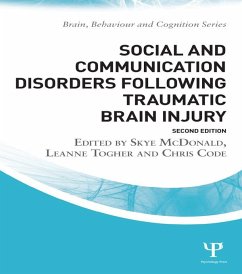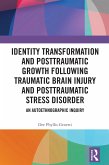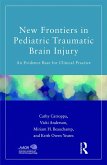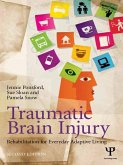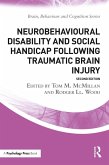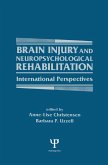Social and Communication Disorders Following Traumatic Brain Injury (eBook, PDF)
Redaktion: McDonald, Skye; Code, Chris; Togher, Leanne
62,95 €
62,95 €
inkl. MwSt.
Sofort per Download lieferbar

31 °P sammeln
62,95 €
Als Download kaufen

62,95 €
inkl. MwSt.
Sofort per Download lieferbar

31 °P sammeln
Jetzt verschenken
Alle Infos zum eBook verschenken
62,95 €
inkl. MwSt.
Sofort per Download lieferbar
Alle Infos zum eBook verschenken

31 °P sammeln
Social and Communication Disorders Following Traumatic Brain Injury (eBook, PDF)
Redaktion: McDonald, Skye; Code, Chris; Togher, Leanne
- Format: PDF
- Merkliste
- Auf die Merkliste
- Bewerten Bewerten
- Teilen
- Produkt teilen
- Produkterinnerung
- Produkterinnerung

Bitte loggen Sie sich zunächst in Ihr Kundenkonto ein oder registrieren Sie sich bei
bücher.de, um das eBook-Abo tolino select nutzen zu können.
Hier können Sie sich einloggen
Hier können Sie sich einloggen
Sie sind bereits eingeloggt. Klicken Sie auf 2. tolino select Abo, um fortzufahren.

Bitte loggen Sie sich zunächst in Ihr Kundenkonto ein oder registrieren Sie sich bei bücher.de, um das eBook-Abo tolino select nutzen zu können.
This book fills this important gap in the literature and provides information ranging from a broad overview of the nature of pathology following TBI and its effects on cognition and behaviour, through to the latest evidence about ways to assess and treat social and communication disorders.
- Geräte: PC
- mit Kopierschutz
- eBook Hilfe
- Größe: 4.24MB
Andere Kunden interessierten sich auch für
![A Different Perspective After Brain Injury (eBook, PDF) A Different Perspective After Brain Injury (eBook, PDF)]() Christopher YeohA Different Perspective After Brain Injury (eBook, PDF)27,95 €
Christopher YeohA Different Perspective After Brain Injury (eBook, PDF)27,95 €![Identity Transformation and Posttraumatic Growth Following Traumatic Brain Injury and Posttraumatic Stress Disorder (eBook, PDF) Identity Transformation and Posttraumatic Growth Following Traumatic Brain Injury and Posttraumatic Stress Disorder (eBook, PDF)]() Dee Phyllis GenettiIdentity Transformation and Posttraumatic Growth Following Traumatic Brain Injury and Posttraumatic Stress Disorder (eBook, PDF)51,95 €
Dee Phyllis GenettiIdentity Transformation and Posttraumatic Growth Following Traumatic Brain Injury and Posttraumatic Stress Disorder (eBook, PDF)51,95 €![New Frontiers in Pediatric Traumatic Brain Injury (eBook, PDF) New Frontiers in Pediatric Traumatic Brain Injury (eBook, PDF)]() Cathy CatroppaNew Frontiers in Pediatric Traumatic Brain Injury (eBook, PDF)57,95 €
Cathy CatroppaNew Frontiers in Pediatric Traumatic Brain Injury (eBook, PDF)57,95 €![Traumatic Brain Injury (eBook, PDF) Traumatic Brain Injury (eBook, PDF)]() Jennie PonsfordTraumatic Brain Injury (eBook, PDF)37,95 €
Jennie PonsfordTraumatic Brain Injury (eBook, PDF)37,95 €![Blossoming Into Disability Culture Following Traumatic Brain Injury (eBook, PDF) Blossoming Into Disability Culture Following Traumatic Brain Injury (eBook, PDF)]() Dee Phyllis GenettiBlossoming Into Disability Culture Following Traumatic Brain Injury (eBook, PDF)22,95 €
Dee Phyllis GenettiBlossoming Into Disability Culture Following Traumatic Brain Injury (eBook, PDF)22,95 €![Neurobehavioural Disability and Social Handicap Following Traumatic Brain Injury (eBook, PDF) Neurobehavioural Disability and Social Handicap Following Traumatic Brain Injury (eBook, PDF)]() Neurobehavioural Disability and Social Handicap Following Traumatic Brain Injury (eBook, PDF)54,95 €
Neurobehavioural Disability and Social Handicap Following Traumatic Brain Injury (eBook, PDF)54,95 €![Brain Injury and Neuropsychological Rehabilitation (eBook, PDF) Brain Injury and Neuropsychological Rehabilitation (eBook, PDF)]() Brain Injury and Neuropsychological Rehabilitation (eBook, PDF)28,95 €
Brain Injury and Neuropsychological Rehabilitation (eBook, PDF)28,95 €-
-
-
This book fills this important gap in the literature and provides information ranging from a broad overview of the nature of pathology following TBI and its effects on cognition and behaviour, through to the latest evidence about ways to assess and treat social and communication disorders.
Dieser Download kann aus rechtlichen Gründen nur mit Rechnungsadresse in A, B, BG, CY, CZ, D, DK, EW, E, FIN, F, GR, HR, H, IRL, I, LT, L, LR, M, NL, PL, P, R, S, SLO, SK ausgeliefert werden.
Produktdetails
- Produktdetails
- Verlag: Taylor & Francis eBooks
- Seitenzahl: 432
- Erscheinungstermin: 4. Dezember 2013
- Englisch
- ISBN-13: 9781136768644
- Artikelnr.: 40141290
- Verlag: Taylor & Francis eBooks
- Seitenzahl: 432
- Erscheinungstermin: 4. Dezember 2013
- Englisch
- ISBN-13: 9781136768644
- Artikelnr.: 40141290
- Herstellerkennzeichnung Die Herstellerinformationen sind derzeit nicht verfügbar.
Skye McDonald is Professor of Clinical Neuropsychology at the University of New South Wales. She is an experienced clinical neuropsychologist and a senior researcher specializing in disorders of communication, social cognition and emotion following traumatic brain injury. McDonald has over 100 peer reviewed research studies focusing on these topics. She leads a Centre of Research Excellence in psychosocial rehabilitation following traumatic brain injury and is Associate Editor of the Journal of the International Neuropsychological Society. Leanne Togher is Professor of Communication Disorders following Traumatic Brain Injury, Senior Research Fellow of the National Health and Medical Research Council and Principal Research Fellow of the University of Sydney. Togher is widely known for her work characterizing discourse and communication disorders post-TBI. Togher has published over 80 peer reviewed journal articles, and serves on a number of editorial boards, including the Journal of Rehabilitation Medicine, Aphasiology, Brain Impairment and Brain Injury. Chris Code is a Fellow of the Royal College of Speech and Language Therapists, and the British Psychological Society. He trained as a speech-language pathologist-therapist with degrees in psychology and linguistics. He is a Professorial Research Fellow in Psychology at the University of Exeter, Foundation Professor of Communication Sciences and Disorders (Hon) at the University of Sydney and co-founding Editor of Aphasiology. Research interests include the neuropsychology of language and speech, psychosocial consequences, recovery and treatment of aphasia.
1. Social and Communication disorders following traumatic brain injury. 2.
Traumatic Brain Injury: Basic Features 3. The nature of cognitive deficits
and psychosocial function following TBI 4. Cognitive communication
disability following TBI: Examining discourse, pragmatics, behaviour and
executive functioning 5. Disorders of social cognition and social behaviour
following severe TBI 6. A theoretical approach to understanding social
dysfunction in children and adolescents with TBI 7. Issues in the
assessment and treatment of cognitive communication disorders in children
with TBI 8. Dysarthria in children and adults with TBI 9. Higher-Level
Cognitive-Communication Approaches in Chronic TBI to Harness Brain
Plasticity 10. Evidence-based Practice and Cognitive Rehabilitation Therapy
11. Communication and Social Skills Training 12. Training communication
partners of people with TBI: Communication really is a two way process 13.
Using single-case methodology to treat social-pragmatic communication
disorders.
.
Traumatic Brain Injury: Basic Features 3. The nature of cognitive deficits
and psychosocial function following TBI 4. Cognitive communication
disability following TBI: Examining discourse, pragmatics, behaviour and
executive functioning 5. Disorders of social cognition and social behaviour
following severe TBI 6. A theoretical approach to understanding social
dysfunction in children and adolescents with TBI 7. Issues in the
assessment and treatment of cognitive communication disorders in children
with TBI 8. Dysarthria in children and adults with TBI 9. Higher-Level
Cognitive-Communication Approaches in Chronic TBI to Harness Brain
Plasticity 10. Evidence-based Practice and Cognitive Rehabilitation Therapy
11. Communication and Social Skills Training 12. Training communication
partners of people with TBI: Communication really is a two way process 13.
Using single-case methodology to treat social-pragmatic communication
disorders.
.
1. Social and Communication disorders following traumatic brain injury. 2.
Traumatic Brain Injury: Basic Features 3. The nature of cognitive deficits
and psychosocial function following TBI 4. Cognitive communication
disability following TBI: Examining discourse, pragmatics, behaviour and
executive functioning 5. Disorders of social cognition and social behaviour
following severe TBI 6. A theoretical approach to understanding social
dysfunction in children and adolescents with TBI 7. Issues in the
assessment and treatment of cognitive communication disorders in children
with TBI 8. Dysarthria in children and adults with TBI 9. Higher-Level
Cognitive-Communication Approaches in Chronic TBI to Harness Brain
Plasticity 10. Evidence-based Practice and Cognitive Rehabilitation Therapy
11. Communication and Social Skills Training 12. Training communication
partners of people with TBI: Communication really is a two way process 13.
Using single-case methodology to treat social-pragmatic communication
disorders.
.
Traumatic Brain Injury: Basic Features 3. The nature of cognitive deficits
and psychosocial function following TBI 4. Cognitive communication
disability following TBI: Examining discourse, pragmatics, behaviour and
executive functioning 5. Disorders of social cognition and social behaviour
following severe TBI 6. A theoretical approach to understanding social
dysfunction in children and adolescents with TBI 7. Issues in the
assessment and treatment of cognitive communication disorders in children
with TBI 8. Dysarthria in children and adults with TBI 9. Higher-Level
Cognitive-Communication Approaches in Chronic TBI to Harness Brain
Plasticity 10. Evidence-based Practice and Cognitive Rehabilitation Therapy
11. Communication and Social Skills Training 12. Training communication
partners of people with TBI: Communication really is a two way process 13.
Using single-case methodology to treat social-pragmatic communication
disorders.
.
